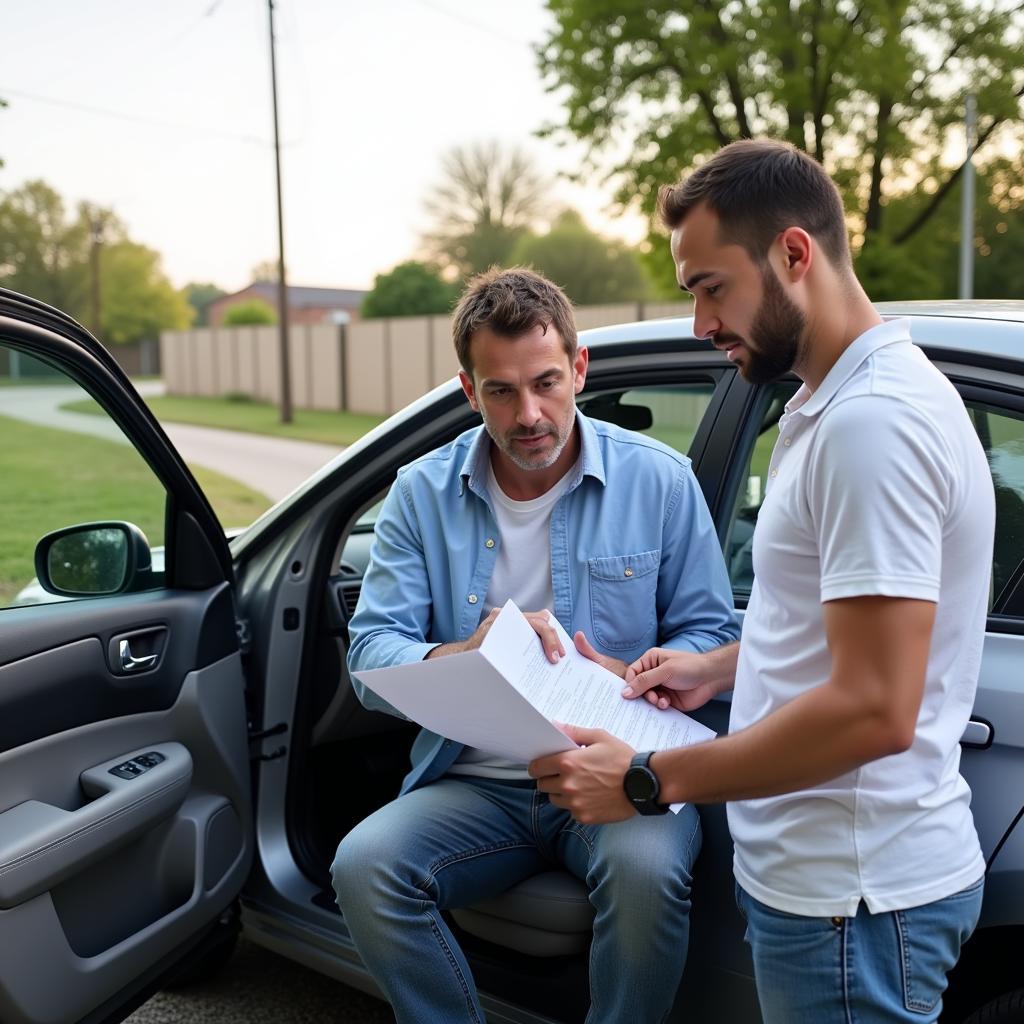Rear-end collisions are unfortunately common, leaving car owners with the daunting question: “How much to fix a rear-ended car?” The answer, unfortunately, isn’t straightforward. The cost to repair a rear-ended vehicle hinges on a multitude of factors, from the severity of the impact to the make and model of your car. This comprehensive guide will break down these factors, providing you with the knowledge you need to navigate the repair process.
Estimating repair costs after a rear-end collision can be tricky. The damage isn’t always immediately visible. While a dented bumper is obvious, underlying damage to the frame, suspension, or even electrical systems might lurk beneath the surface. Accurately assessing the full extent of the damage is crucial for determining the true cost of repairs. This can often involve a professional inspection. Similar to fixing alignment.on.a.car, addressing frame damage after a rear-end collision is crucial.
Factors Influencing Repair Costs
Several key factors contribute to the overall cost of repairing a rear-ended car:
- Extent of the Damage: A minor fender bender will obviously cost less to fix than a major collision that requires extensive bodywork and mechanical repairs. The speed of the impact plays a significant role here.
- Make and Model of Your Car: Luxury vehicles and those with specialized parts typically cost more to repair. The availability of parts also plays a role; if parts are scarce or need to be imported, expect higher costs.
- Labor Costs: The hourly rate for auto repair technicians varies depending on location and the shop’s expertise. Complex repairs requiring specialized skills will naturally command higher labor charges.
- Hidden Damage: As mentioned earlier, internal damage can significantly impact the final bill. Diagnostic testing might be necessary to uncover hidden problems with the frame, suspension, or electrical systems.
Understanding the Repair Process
Once the damage is assessed, the repair process typically involves these steps:
- Bodywork: Repairing dents, replacing damaged panels (bumper, trunk lid, etc.), and ensuring proper alignment.
- Mechanical Repairs: Addressing damage to the suspension, exhaust system, or other mechanical components.
- Painting: Matching the new paint to the existing finish for a seamless repair.
- Final Inspection: Ensuring all repairs are completed correctly and the car is safe to drive.
Estimating the Cost: Minor vs. Major Damage
Minor rear-end collisions resulting in superficial damage, such as a dented bumper or scratched paint, might cost anywhere from a few hundred to a couple of thousand dollars. However, substantial damage involving frame distortion, airbag deployment, or mechanical issues can easily push the cost into the thousands or even tens of thousands of dollars, depending on the vehicle. Just like how to fix car oil leaks, addressing minor damage quickly can prevent more costly repairs later.
What to Do After a Rear-End Collision
- Ensure Safety: Move your vehicle to a safe location if possible.
- Contact the Authorities: Report the accident to the police, even if the damage appears minor.
- Document the Damage: Take photos and videos of the damage to both vehicles.
- Exchange Information: Exchange insurance information with the other driver.
- Contact Your Insurance Company: Report the accident to your insurance company as soon as possible.
- Get Multiple Repair Estimates: Don’t settle for the first estimate. Get quotes from multiple reputable repair shops. Like figuring out how much does fixing a broken car window cost, getting multiple quotes ensures you get a fair price for rear-end repairs.
Working with Insurance Companies
Navigating the insurance claim process can be challenging. Your insurance company will likely assign an adjuster to assess the damage and determine the payout. Be prepared to provide all necessary documentation, including the police report, photos, and repair estimates. Remember, you have the right to choose your own repair shop. If you’re unsure about how to fix a muffler on a car after a rear-end collision, a qualified mechanic can help.
 Working with Insurance Adjuster
Working with Insurance Adjuster
Tips for Minimizing Repair Costs
- Choose a Reputable Repair Shop: A qualified technician can often find cost-effective solutions. Much like addressing how to fix an oil leak in your car, experienced mechanics can identify the source of the problem and provide effective solutions.
- Consider Aftermarket Parts: Using aftermarket parts, when appropriate, can help reduce the cost of repairs.
- Negotiate with the Repair Shop: Don’t be afraid to negotiate on the price, especially if you have multiple estimates.
Conclusion
Determining how much to fix a rear-ended car isn’t simple. Various factors contribute to the final cost. By understanding these factors and following the steps outlined in this guide, you can navigate the repair process with confidence. For personalized assistance and expert advice on auto repairs, contact AutoTipPro at +1 (641) 206-8880. Our office is located at 500 N St Mary’s St, San Antonio, TX 78205, United States.
 Car After Repair
Car After Repair
FAQs
- Can I drive my car after a rear-end collision? It depends on the severity of the damage. If the car is unsafe to drive, it should be towed.
- Who pays for the repairs after a rear-end collision? Typically, the at-fault driver’s insurance company is responsible for covering the costs.
- What if the other driver doesn’t have insurance? Your uninsured motorist coverage will likely apply.
- How long does it take to repair a rear-ended car? The repair time depends on the extent of the damage, ranging from a few days to several weeks.
- Do I need to get a police report for a minor rear-end collision? Yes, it’s always recommended to file a police report, even for minor accidents.
- What if I disagree with the insurance company’s estimate? You can negotiate with the insurance company or seek an independent appraisal.
- Will a rear-end collision affect my car’s resale value? Even with proper repairs, a reported accident can potentially impact resale value.






Leave a Reply